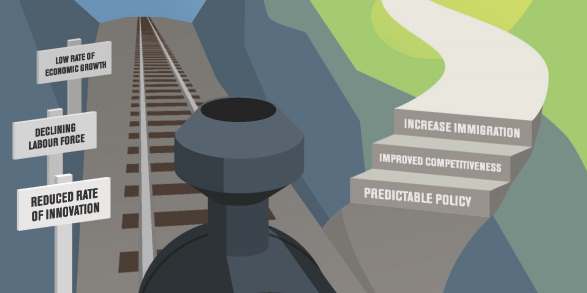Prime Minister Trudeau has stated unequivocally that he won’t reduce Canadian taxes to remain competitive.
investment
Canada’s economy has grown at or above 1 per cent in 18 different quarters since 2000.
Growth expectations from private-sector economists have consistently declined since this government came to power.
The Chrétien Liberals reduced the capital gains inclusion rate to help improve Canada’s competitiveness and attractiveness to investors.
The Liberal government remains committed to a misguided fiscal policy approach that spends borrowed money in the hopes of increasing prosperity.
The idea that we are trapped in a “new normal” of slow economic growth has gained currency with many analysts. Proponents list a number of factors allegedly restraining the trend of growth.
There are times when a problem can be solved with a small fix and perhaps a little tinkering. And there are times when a big fix or fundamental reform is needed. Quebec’s government finances fall into the latter category.
When Ontario Finance Minister Charles Sousa announced a budget update and a revised, lower forecast for provincial economic growth, it was yet another piece of evidence that Ontario’s economy is sluggish. But Ontario’s problems run deeper than just one fiscal update from one finance minister.
Question: If you’re young, or have very little education, where’s the best place in the country to find a job, make a decent income and prosper? Answer: Alberta, followed by Saskatchewan and British Columbia.

